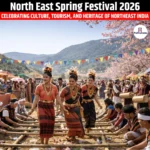| GS Paper I: Modern Indian History |
Context:
Eminent social reformer and rationalist Periyar Erode Venkatappa Ramasamy was commemorated on his 146th birth anniversary on September 17.
About Periyar Erode Venkatappa Ramasamy
- Erode Venkata Ramasamy, born on September 17, 1879, hailed from a Kannada-speaking family in Erode.
- V. Ramasamy married at the age of 19. His first wife, Nagammai, passed away in 1933, and they had a daughter who lived only for 5 months.
- He remarried on April 9, 1949, to Maniammai, who continued his social work after his death in 1973.
- Erode Venkata Ramasamy was a prominent Indian social activist and politician, known for founding the Self-Respect Movement and the Dravidar Kazhagam.
- He is often referred to as the ‘Father of Modern Tamil Nadu’ and Paguththarivu Pagalavan.
- Periyar passed away on December 24, 1973, at the age of 95.
- In 1978, India Post commemorated E.V. Ramasamy with a postage stamp.
Early life
- In 1885, at the age of 6, Periyar began attending a small primary school.
- By 1889, at the age of 10, his formal schooling had concluded within five years.
- In 1891, at the age of 12, he joined his father’s trade.
- He was proficient in three Dravidian languages: Kannada, Telugu, and Tamil.
Periyar – Title
The title “Periyar” was bestowed upon him by the Tamil Nadu Women’s Conference held in Madras on November 13, 1938. The conference was presided over by Neelambigai Ammaiyaar, the daughter of Maraimalai Adigal, a distinguished Tamil scholar. Dr. Dharmambal awarded him the title “Periyar.”
In Tamil, the word “Periyar” means “respected one” or “elder.”
Kasi Pilgrimage incident
- In 1904, E.V. Ramasamy undertook a pilgrimage to Kashi to visit the Shiva temple of Kashi Vishwanath.
- During his visit, he observed troubling practices such as begging and the sight of floating dead bodies.
- A specific incident in Kashi deeply influenced E.V. Ramasamy’s beliefs and subsequent efforts.
Member of Congress Party (1919-1925)
- V. Ramasamy joined the Indian National Congress in 1919.
- He chaired the Erode Municipality in 1918 and actively promoted constructive initiatives such as encouraging the use of Khadi, picketing toddy shops, boycotting stores selling foreign cloth, and working to eradicate untouchability.
- Following Gandhi’s call to wear Khadi, Periyar immediately discarded his expensive foreign clothes and adopted Khadi. He also insisted that all his family members, including his 80-year-old mother, wear Khadi exclusively.
- He was arrested during the Non-Cooperation Movement in 1920.
- In 1921, Periyar faced imprisonment for his efforts in picketing toddy shops in Erode.
- During the anti-liquor campaign of 1921, he cut down 1,000 trees on his own farm.
- In 1922, Periyar, along with his wife Nagammal and sister Kannammal, led women volunteers in picketing liquor shops.
- Also in 1922, he was elected President of the Madras Presidency Congress Committee at the Tirupur session, where he advocated strongly for reservations in government jobs and education.
- His proposals were met with resistance within the Congress Party, leading to his departure from the party in 1925.
- Periyar made a final attempt to secure the Tamil Nadu Congress’s support for communal representation at a 1925 conference in Kanchipuram. However, President Thiru V.Ka blocked his proposal due to open opposition, prompting Periyar to leave the Congress.
- His persistent public meetings on communal representation pressured the government to enact G.O.No.1129 on December 15, 1928, which ensured proportional representation for Brahmins, non-Brahmins, Christians, Muslims, and depressed classes in public offices.
Vaikom Satyagraha (1924-1925)
The goal of the Satyagraha, which began on March 30, 1924, was to secure the right for untouchables to use a road near the Shiva/Mahadeva temple in Vaikom, Kottayam district, Kerala.
In Kerala, a committee was formed to combat untouchability, consisting of individuals from various castes. This committee was chaired by K. Kelappan, with other members including T.K. Madhavan, Velayudha Menon, Kurur Neelakantan Namboodiripad, and T.R. Krishnaswami Iyer. The movement also saw participation from prominent figures like Gandhiji, Chattampi Swamikal, and Sree Narayana Guru.
The Vaikom Satyagraha was initially led by
- Madhavan, P. Kesava Menon, and George Joseph before Periyar took over the leadership. The people of Kerala requested Periyar, from Tamil Nadu, to lead the movement. Under his leadership, the agitation intensified, leading to his arrest and imprisonment on two occasions. As a result of the movement’s efforts, the streets were eventually opened to untouchables.
Cheranmadevi Gurukulam – 1925
In 1925, a residential school called Cheranmadevi Gurukulam was established and managed by V.S. Iyer in Cheranmadevi, Tirunelveli district.
At this school, Periyar observed that Brahmin and Non-Brahmin children were served food in separate locations.
He recommended to Iyer that all children be treated equally. Periyar highlighted this issue in public meetings, raising awareness about the segregation occurring at Gurukulam.
He also brought the matter to the attention of the state Congress meeting. Ultimately, due to these efforts, the school was closed.
Self-Respect Movement – 1925
After leaving the Congress, Periyar founded the Self-Respect Movement in 1925. The movement aimed to elevate the Dravidian community and challenge Brahminical oppression.
The first provincial conference of the Self-Respect Movement was held by Periyar in Chengalpattu in February 1929, with Mr. W.P.A. Soundara Pandian as the president. The conference also saw participation from Soundrapandiyanar, Kutthusi Gurusamy, and Moovalur Ramamirtham Ammaiyar.
The second provincial conference took place in Erode, with Periyar as the host and Mr. M.R. Jayakar, a rationalist leader from Pune, as the chairman. During this conference, Periyar introduced the “Self-Respect Marriage” system, a new rationalist approach to marriage.
Journals and Books by Periyar:
- On May 2, 1925, Periyar launched a Tamil weekly titled “Kudi Arasu,” which he edited himself to promote the principles of Self-Respect.
- On November 7, 1928, he published an English magazine called “Revolt.”
- In 1930, Periyar released a book on “Family Planning” (Birth Control) to advocate for limiting the number of children.
- In 1933, he launched another magazine named “Puratchi” (Revolution).
- On January 12, 1934, Periyar introduced the Tamil weekly “Pagutharivu” (Rationalism).
- He also wrote and published a book titled “Pen Yenn Adimaiyanaal?” (Why Women Are Enslaved?).
- The Justice Party began publishing the Tamil weekly “Viduthalai” on June 1, 1935. It was later handed over to Periyar, who transformed it into a Tamil daily newspaper starting January 1, 1937.
- On January 22, 1950, Periyar was sentenced to imprisonment for publishing his book “Ponmozhigal” (Golden Sayings).
- In 1970, Periyar established the Tamil bi-monthly “Unmai” (Truth) in Tiruchirapalli.
- Why I am an Atheist is an essay penned by Indian revolutionary Bhagat Singh in 1930 while in Lahore. At the request of Periyar E.V. Ramasamy, P. Jeevanandham translated this essay into Tamil.
- On January 13, 1935, Periyar introduced reforms to the Tamil language, which were later implemented by the Tamil Nadu government under Chief Minister M.G. Ramachandran in 1978.
Periyar delivered his final speech, known as his swansong, on December 19, 1973, at Thiyagaraya Nagar in Chennai.
On June 27, 1970, UNESCO honoured Periyar with the title “The Socrates of South Asia.”
UNESCO described Periyar as:
- The prophet of the new age
- The father of the social reform movement
- The arch-enemy of ignorance, superstition, and meaningless customs.
Explore our courses: https://apnipathshala.com/courses/
Explore Our test Series: https://tests.apnipathshala.com/










